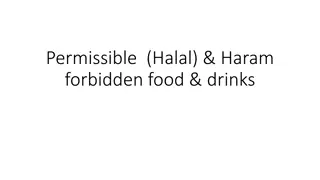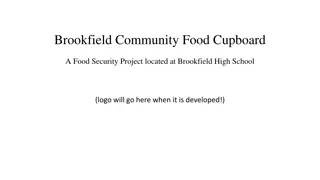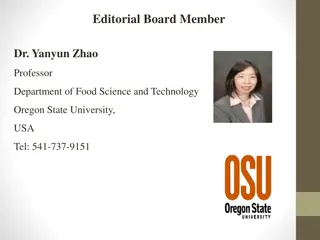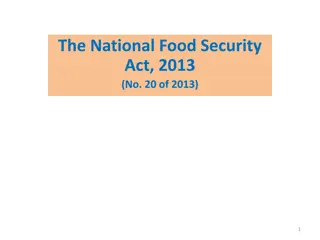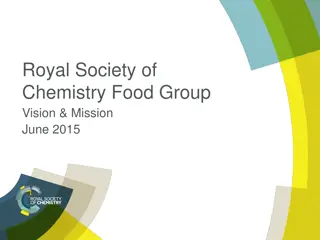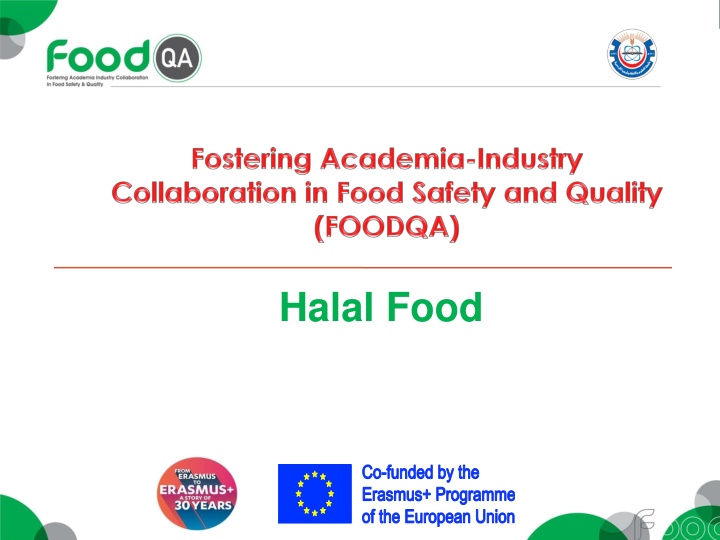
Understanding Halal Food Regulations and Requirements
Discover the significance of Halal food in Islamic law, the justification for its prohibition, and the current status of the global Halal food market. Learn about the strict regulations, authorities' roles, and requirements for ensuring the authenticity of Halal foods.
Download Presentation

Please find below an Image/Link to download the presentation.
The content on the website is provided AS IS for your information and personal use only. It may not be sold, licensed, or shared on other websites without obtaining consent from the author. If you encounter any issues during the download, it is possible that the publisher has removed the file from their server.
You are allowed to download the files provided on this website for personal or commercial use, subject to the condition that they are used lawfully. All files are the property of their respective owners.
The content on the website is provided AS IS for your information and personal use only. It may not be sold, licensed, or shared on other websites without obtaining consent from the author.
E N D
Presentation Transcript
Halal Food Definition. A comprehensive definition for Halal food which is fit for human consumption , should be nutrition , and should be allowed according to the Sharia`a (Islamic) law, any item/service that is to be consumed by Muslims has to comply with its precepts.
Justification for the prohibition Allah did not prohibit anything for the mankind unless He intends to prevent mankind from harm. The reasons behind this might be clear for human beings. However, in some cases such reasons might not be clear. That is because Allah had created human beings and He knows what would benefit them in this life and in the hereafter.
Current Status and future prospects of Halal food the global Muslim population is about two billion, representing around 25% of the global population. the international halal market is estimated to be worth more than US$2.3 trillion. Mainly food sector scientific and technological progress, increased awareness regarding the health advantages of Halal foods had resulted in great interest in the Halal foods. This is because food additives could be obtained from Non-halal sources. Also, some prohibited ingredients could be used such as certain enzymes, hormones, pork products and alcohols.
Halal Food regulations. Islamic countries had decreed restrict regulation, laws and provision to ensure that only Halal food are allowed and should not be mixed with Prohibited Non-Halal foods.
Authorities role Towards Halal food Tightening control regarding the source of foods (especially meats and products thereof ) while taking samples from suspected foods may contain non-Halal products. Countries are advised to be careful when sending any foods to this region and ensure that these foods are free from suspicious products which may be Non- halal. It is necessary to submit official documents indicating that the sent foods do not contain any prohibited substances and its source should be Halal . These documents should be issued from authorities and organizations that are approved. The consumer should be careful when buying any imported food item and should study the label and inform the concerned authorities if he / she discovers any violations. 1. 2. 3. 4.
Requirements of Halal Foods 1. Food is obtained from animals which were slaughtered according to the Sharia a principles. 2. The food should not contain any ingredient that is prohibited Non-halal according to the Sharia`a 3. The food should not be mixed with any prohibited Non-halal foods during the preparation storage, manufacturing or transportation. 4. Prohibited Non-halal foods should not be mixed with Halal foods during preparation, manufacturing, storage and display.
halal certification system Malaysia is considered now a Leading Global Halal Food Hub The Malaysian government, has aimed to establish a global halal standard. The introduction of designated Malaysian Halal Parks. Malaysian government has also implemented Halal Industry Master Plan as a hub for halal On the other hand UAE Positions Itself as Global Hub for Halal Products The United Arab Emirates is planning to challenge Malaysia as the global hub for Halal Products
Jordan Halal Logo Certification Obligations: 1.Commitment to apply Islamic Shariah Rules in ORG and not dealing with non-halal. 2. Ensuring that sources of ingredients are halal and deal with suppliers holding Halal certificate. 3. Awareness of employees on halal concept. 4. Providing the opportunity to perform basic Islamic Practices eg. daily compulsory solat, Fasting etc.
Jordan Halal Logo Certification 5. Serving or eating non-halal foods and beverages in ORG are not permitted. 6. Any printed or published materials, posters and advertisements that may offend the Muslims public are not allowed.
Jordan Halal Logo Certification Procedure for Halal Certification: Provide all the necessary arrangements in ORG for Certificate department\JSMO including materials, documentation and information and facilitate the access to all areas at any time with/without prior notice in order to carry out all the activities. Provide a proof of the possibility of testing to ensure continued product conformity, or perform these tests in an external laboratory. validity of all data and information provided by the ORG to CT in order to grant the certificate and license to use the logo.
Jordan Halal Logo Certification Requirements: 1. Comply with: Jordanian standards(JS) JS1475:2001 ( Labelling- General Guidelines on the using of Halal term). (General Requirements for Halal Food) which is issued in reference to OIC/SMIIC standard1/2011 ( General Guidelines on Halal Food) and Gulf standard regarding slaughtering animals according to Islamic Rules. 2. Implement of ISO 22000(FSMS). 3. Comply with Jordanian product standard(s) and technical regulations related to the food products. 4. Always complies with currently in force legislations related to food issued by any official party.
Jordan Halal Logo Certification Steps for granting the Certificate: 1. ORG fill an application and submits it to CT with all required information including: General information of ORG. Description of raw & intermediate materials using in production for each product. Provide a proof that the detergents and maintenance materials which come into contact with product and Wrapped & packaging grade/consist of Halal materials according to Islamic Shariah Rules. materials are food
Jordan Halal Logo Certification 2. CT reviews the filled application and evaluates it. 3. Upon accepting the application CT ask ORG to submit the necessary documents then review them upon receiving. the necessary documents consist of: formal registration, structure, certificates, qualification of employees, for theORG. 4. A pre-audit visit to the ORG shall be performed then CT take the decision on the application and informing ORG.
Jordan Halal Logo Certification 5. Approving the application then Signing the Contract. 6. on-site Audit by Audit Team including Mufti. 7. A samples of products are taken during on-site audit visit for Lab. testing in an approved laboratories. 8. collect the Audit Team reports, samples testing reports and all related documents to be sent to Certification Committee to study and take a review and decision. 9. certification committee shall consist min.of (3)members including mufti.
THANK YOU CONTACT US Khaled khraisat kkhraisat@monojo.com.joo




![Halal_Chicken_from_Brazil-_Ensuring_Quality_and_Authenticity[1]](/thumb/86918/halal-chicken-from-brazil-ensuring-quality-and-authenticity-1.jpg)

